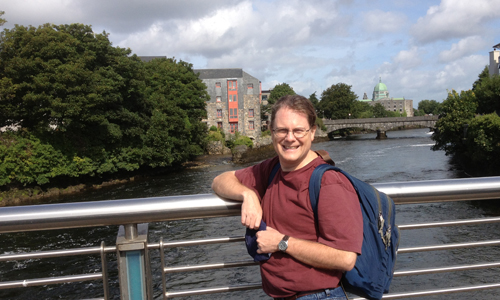Forget Superman spinning around the world to turn back history. Steve Scanlan wants to know if empowered women can help protect the planet.
Researchers have studied the effect of climate change on women, but Professor Scanlan says there’s an important question not yet examined: What is the effect of women on climate change?
Scanlan received a Fulbright award for his upcoming research at the National University of Ireland in Galway, where he will locate in the School of Sociology and Political Science and seek collaboration with the Irish Centre for Rural Transformation and Sustainability and the Ryan Institute, two programs supporting research on the effects of human systems on ecological change. Scanlan is an Associate Professor of Sociology in the Ohio University College of Arts & Sciences, where he received the Eric A. Wagner Endowed Professorship for three years.
“Despite the attention that climate change and sustainability attract from academics, activists and policymakers throughout the world, there remains limited empirical and theoretical analysis of the impact of ecofeminist and gender and development ideals on reducing the global ecological footprint and that of individual nations,” notes Scanlan. Existing research “focuses primarily on outcomes… how women are affected by development.”
“My project is interested more in how women affect development, and not the other way around,” he says. “With empowerment, women have an increasingly important role shaping development and sustainability.”
Victims or Protagonists?
In ecofeminism, are women victims or protagonists? The term ecofeminism developed to connect the notion of the exploitation of women with the exploitation of the environment. The concept also captures the symbolism of sustenance and creation that join women with nature. But is there a leading role for women in the planet’s next chapter?
Scanlan will investigate “the premise that female empowerment helps protect the planet.” He will look at three primary questions:
- What is the impact of female empowerment and proximity to gender equality on a country’s ecological footprint?
- What has ecofeminism and the global women’s movement demanded from and contributed to environmental change and sustainability?
- How have they framed their perspectives on sustainability and environmental justice concerns?
Scanlan’s work will include data from multiple sources, including the Global Footprint Network, which plots the resources consumed and the environmental impact to produce a country’s ecological footprint. He also will look at a country’s biocapacity relative to its resources as a sustainability measure. The United Nations Development Programme provides data on gender inequality measures, and Scanlan will build on his earlier articles on food security and HIV/AIDS.
What’s the Buzz?
The nature of the dialogue also will shape Scanlan’s study of women’s role in the environment. In sociological terms, the “ecological frames” used by the global women’s movement and ecofeminists form the basis for qualitative study. From policy papers to press coverage, he will examine the messaging around women’s role.
“The qualitative data is valuable on its own for understanding the place of gender-focused dialogue on sustainable development,” he notes.
While research interests are propelling him across the Atlantic, Scanlan remains tied to teaching. He will be teaching at the NUI Galway School of Political Science and Sociology, and he’ll bring his research back to his classroom in Athens.
“I view each class as a new opportunity to challenge and engage students in the excitement of what C. Wright Mills called the ‘sociological imagination’ and share what sociology offers for understanding the world,” he says.




















Comments